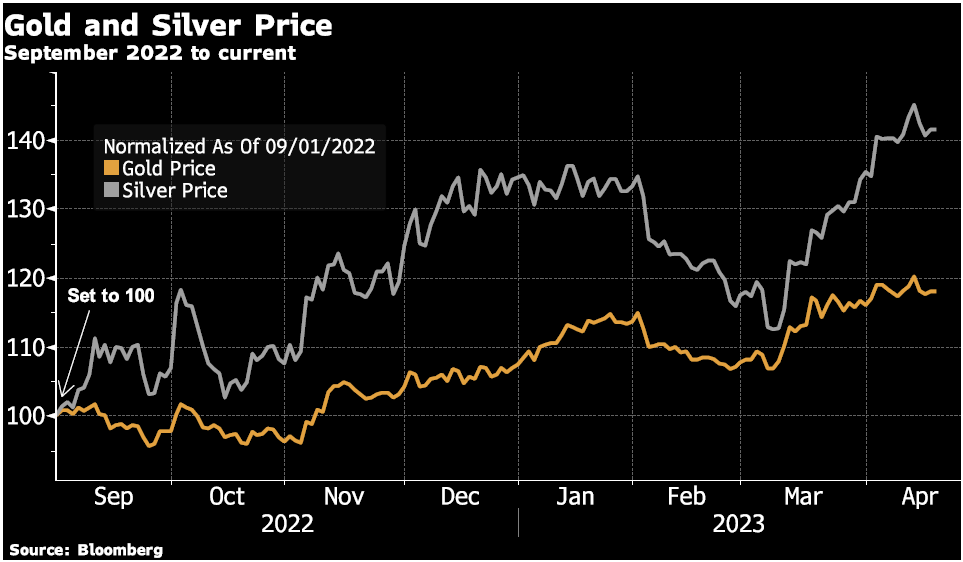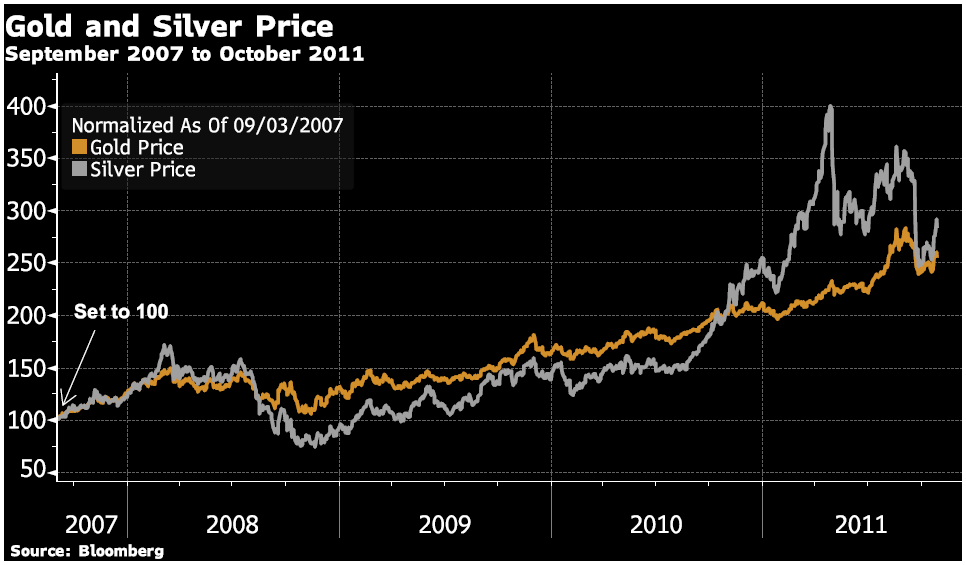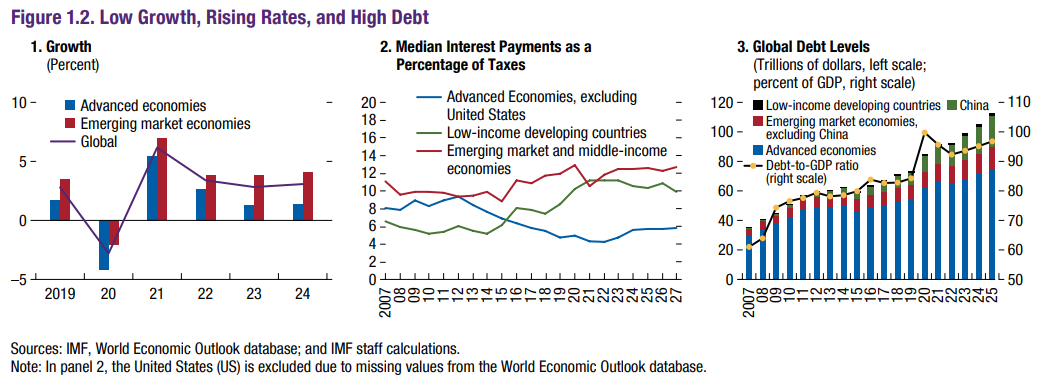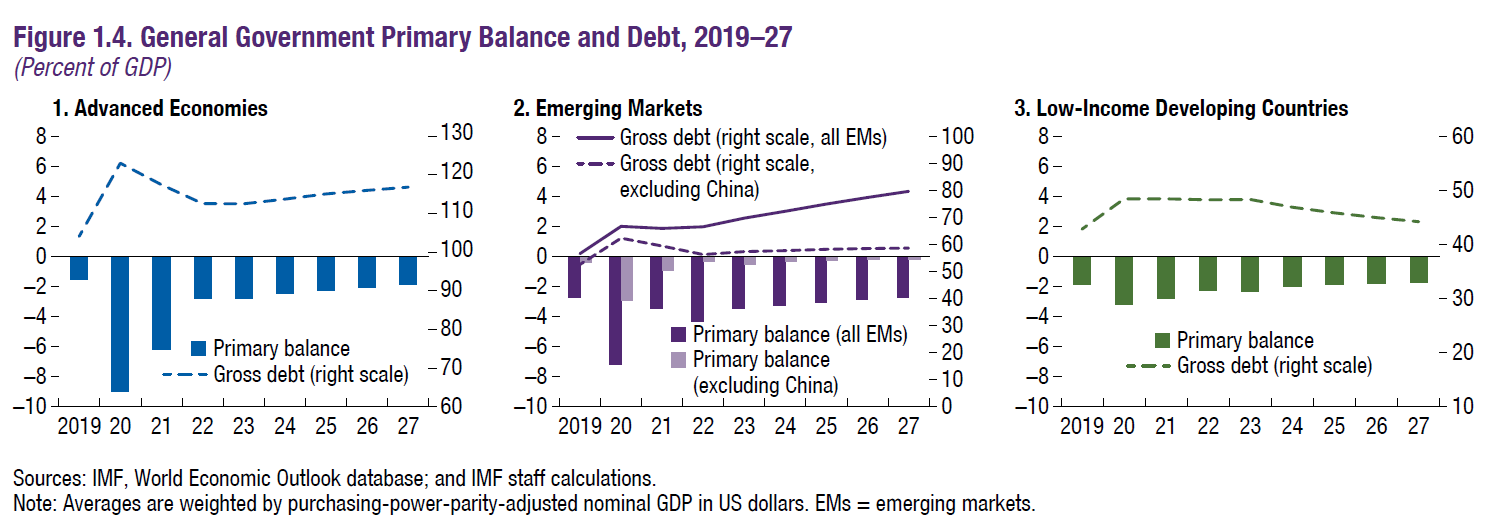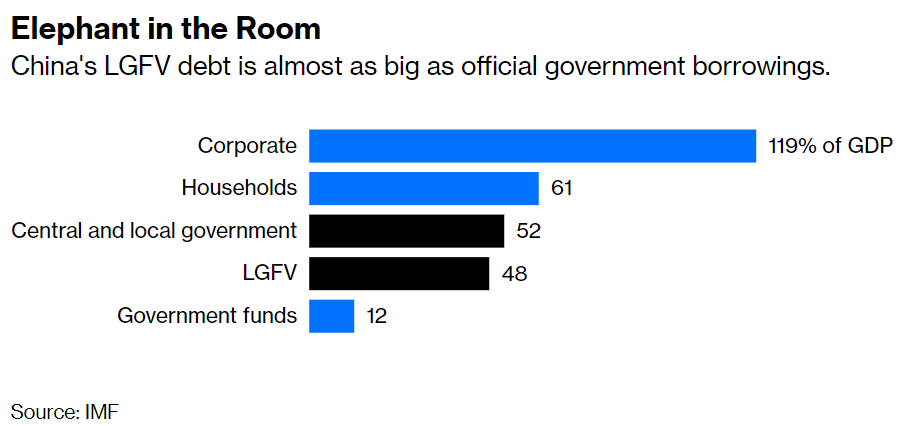
Some who are considering buying gold bullion or silver investment often look closely at the price and ask ‘is now a good time to buy gold?’ This is understandable after all no buying decision should be one that you take lightly and often people want to feel like they have bought ‘at the right time’. So, in this week’s blog, we look at recent gold and silver price gains in the perspective of the financial crisis of 2008 – 2011. Remember, whether you buy gold today or tomorrow, it should be viewed not just as an investment but also as insurance for your portfolio.
In our post on April 13 Has the IMF Told the World to Buy Gold? we discussed the IMF’s (International Monetary Funds) recent release of its Global Financial Stability Report and World Economic Outlook and pointed out that many of the major financial stress factors caused by the rapid tightening of the monetary policy outlined in the reports are positive for gold and silver prices.
How does financial stress impact gold and silver prices
This week we start with putting gold and silver price gains from financial stress in perspective of the recent Great Financial Crisis of 2008-2011.
The chart below shows that silver prices have already rallied 40% from September 1, 2022, with a steep climb starting in mid-March as the problems of Silicon Valley Bank started to unfold and gold prices have climbed almost 20%. We also remind readers that one of the signs of a bull market in precious metals is when the silver price is rising faster than the gold price.
Looking back to the last financial crisis, from the first market concerns about liquidity, and when NetBank failed in September 2007, to the peak of that bank failures cycle, because of the series of quantitative easings by central banks, and the bailouts of Greece, Portugal, and Ireland; Silver reached a peak in April 2011 with a 400% gain and gold reached a peak in September 2011 with a gain of 280%.
In other words, the rally in gold and silver prices is only now getting going and has quite a distance to run higher as current financial vulnerabilities are exposed.
There is the added complication of inflation (see our post on March 30 The Fed is now in a tug-of-war between fighting inflation and saving the banking system) and the much higher debt levels of governments and households.
The third flagship report published by the IMF last week was the Fiscal Monitor which discusses fiscal policy (governments sending less) tightening after the rapid increase in spending to support their respective economies during Covid.
Download Your Free Guide

Governments must deal with high debt levels, alongside modest growth (negative economic growth in the near term) while having to pay higher interest rates on their own debt.
The report states that governments are likely to face additional spending pressures in 2023 as ongoing geopolitical tensions may lead to further increases in defense spending and fiscal support to address negative effects from disruptions to international trade. Industrial policies, including government subsidies, may also emerge to foster import substitution …
… Low-income developing countries, many of which are in or near debt distress or have limited fiscal space, face a particularly difficult balancing act. Many developing countries are grappling with tighter budgetary constraints.
The additional spending pressures, combined with slower growth, and tighter monetary policy due to ongoing inflation pressures will add to debt levels.
3 Reasons Why Patrick Karim is Bullish on Gold
Over the medium term, under current policies, public debt is expected to rise to close to the record levels seen at the height of the pandemic.…. Related fiscal risks typically manifest themselves in weak growth and tight financial conditions. (See chart below from the Fiscal Monitor report.)
The IMF expects debt governments to continue to run deficits and debt levels to rise in all three major categories – advanced economies, emerging markets, and low-income developing countries.
In China, it’s not the central government that holds massive debt, but instead the local governments in aggregate.
China, one of the world’s most indebted nations, has not experienced a full-blown financial crisis, yet. There were a few close calls. In 2019, the government had to seize a regional bank, for the first time in decades, to prevent a run on deposits.
Last year, a wave of real estate developer defaults ended up with homebuyers threatening mortgage boycotts. Both scares got defused. One may even argue that China is now a safer place for investors after Beijing tightened regulations on unruly local banks and aggressive home builders.
There is one more elephant in the room
But there is one more elephant in the room: Borrowings from local government financing vehicles. For years, municipalities have been relying on these off-balance-sheet entities to fund infrastructure and support the local economy.
LGFV debt rose to 57 trillion yuan ($8.3 trillion) in 2022, or 48% of China’s gross domestic product, according to estimates from the International Monetary Fund (Bloomberg, 04/16).
With land prices tumbling and slowing growth in China some provinces are appealing to the central government for a bailout.
And in the US there is the eroding of confidence due to the ongoing raising of the debt ceiling debate which will turn into a crisis and a possible US government shutdown in mid-June if Congress continues to bicker and stonewall (for more on the debt ceiling see our post from January 19 What happens if the debt ceiling raises).
Bottom line – there are many crises on the horizon which will turn more investors to precious metals thus propelling prices higher.
From The Trading Desk
Market Update:
The gold price has remained in a bullish upward channel.
Each time the gold price looks like it is going to sell off, it has held and moved back toward its near-term support at $2,000.
Silver too touched $24.75 before reversing and moving back above the $25 support level.
The market remains cautious for now before the all important May Federal Open Market Committee (FOMC) Monetary policy meeting that takes place on May 3rd.
Markets are pricing in a 25bp hike as March’s inflation data shows inflation continues to run hot.
Recent unemployment numbers don’t imply a recession as yet but there is a lagging effect to these hikes as the Fed tries to navigate a ‘soft landing’.
The gold price, for now, may stay in the current trading range for the rest of the month until the FOMC meeting, for a move higher gold needs to clear $2,015 to look at taking out the recent highs at $2,050.
On the downside levels to watch are the weekly low at $1985 with support at the $1,970 level.
Stock Update:
Silver Britannia’s – We have a limited number of Silver Britannia’s from the Royal Mint, with the lowest premium in the market at spot plus 40% for EU storage/delivery and for UK storage/delivery. Please call our trading desk. Stock is limited at this reduced premium.
Gold Kangaroo’s are available for EU clients, starting at 4.5% over spot, and gold 1oz bars start at 4.2% over Spot.
GoldCore have excellent stock and availability on all gold coins and bars. Please contact our trading desk with any questions you may have.
Buy Gold Coins

GOLD PRICES ( AM/ PM LBMA FIX– USD, GBP & EUR )
| USD $ AM | USD $ PM | GBP £ AM | GBP £ PM | EUR € AM | EUR € PM | |
|---|---|---|---|---|---|---|
| 19-04-2023 | 1976.10 | 1990.55 | 1590.76 | 1598.61 | 1806.95 | 1815.78 |
| 18-04-2023 | 1999.30 | 1999.40 | 1607.64 | 1609.52 | 1821.76 | 1825.05 |
| 17-04-2023 | 2009.80 | 1995.55 | 1623.11 | 1611.21 | 1831.13 | 1825.13 |
| 14-04-2023 | 2035.65 | 2019.40 | 1627.71 | 1621.17 | 1840.63 | 1832.81 |
| 13-04-2023 | 2027.10 | 2048.45 | 1619.04 | 1635.28 | 1838.78 | 1851.80 |
| 12-04-2023 | 2008.90 | 2008.20 | 1618.37 | 1610.17 | 1839.15 | 1827.86 |
| 11-04-2023 | 2001.50 | 2002.70 | 1608.41 | 1610.97 | 1833.17 | 1833.47 |
| 06-04-2023 | 2017.25 | 2001.90 | 1619.04 | 1611.73 | 1851.23 | 1837.54 |
| 05-04-2023 | 2022.30 | 2030.85 | 1622.29 | 1625.90 | 1847.78 | 1853.15 |
| 04-04-2023 | 1982.25 | 2009.60 | 1585.60 | 1607.28 | 1814.16 | 1837.18 |
Buy gold coins and bars and store them in the safest vaults in Switzerland, London or Singapore with GoldCore.
Learn why Switzerland remains a safe-haven jurisdiction for owning precious metals. Access Our Most Popular Guide, the Essential Guide to Storing Gold in Switzerland here
Receive Our Award Winning Market Updates In Your Inbox – Sign Up Here
